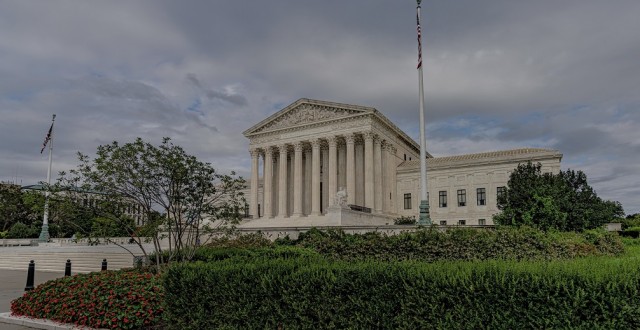
- Mediation
- Arbitration
- Court Neutrals
- Online Dispute Resolution
- Technology
- Court Decisions
- More
- Legislation
- Healthcare
- Guest Posts
- John DeGroote
- John C. Fleming
- Rick Freeman
- Professor Peter Friedman
- Honorable W. Royal Furgeson, Jr.
- James M. Gaitis
- Laura A. Kaster
- Professor John Lande
- Philip J. Loree, Jr.
- Michael McIlwrath
- F. Peter Phillips
- Professor Alan Scott Rau
- Professor Thomas J. Stipanowich
- Professor S.I. Strong
- Richard Webb
- Glen M. Wilkerson
- International arbitration
- Regulation
- Sports and Entertainment
 JAMS Welcomes Karl Bayer to its Panel of NeutralsJAMS, the world’s largest private alternative dispute resolution (ADR) provider, is pleased to announce that Karl Bayer
JAMS Welcomes Karl Bayer to its Panel of NeutralsJAMS, the world’s largest private alternative dispute resolution (ADR) provider, is pleased to announce that Karl Bayer Class Action Waivers in Arbitration Agreements: The Twenty-First Century Arbitration Battleground and Implications for the EU CountriesLinda S. Mullenix, Morris & Rita Atlas Chair in Advocacy at the University of Texas School of Law, has written “Class Ac
Class Action Waivers in Arbitration Agreements: The Twenty-First Century Arbitration Battleground and Implications for the EU CountriesLinda S. Mullenix, Morris & Rita Atlas Chair in Advocacy at the University of Texas School of Law, has written “Class Ac Picking the Proper Technological Tool for Problem-Solving in ArbitrationProfessor Amy J. Schmitz, John Deaver Drinko-Baker & Hostetler Chair in Law and Co-Director of the Translational Data An
Picking the Proper Technological Tool for Problem-Solving in ArbitrationProfessor Amy J. Schmitz, John Deaver Drinko-Baker & Hostetler Chair in Law and Co-Director of the Translational Data An SCOTUS to Resolve Circuit Split Over Transportation Worker Exemption in the FAAToday marks the start of the United States Supreme Court’s new term. During the term, the nation’s highest court will re
SCOTUS to Resolve Circuit Split Over Transportation Worker Exemption in the FAAToday marks the start of the United States Supreme Court’s new term. During the term, the nation’s highest court will re
Recent Posts
International Arbitration of Patent Claims
Thomas H. Lee, Leitner Family Professor of International Law at Fordham University School of Law, has published “International Arbitration of Patent Claims,” in Contemporary Issues in International Arbitration and Mediation: The Fordham Papers 2015 (Arthur W. Rovine, ed., 2016), Forthcoming; Fordham Law Legal Studies Research Paper No. 2849465.
Continue reading...Federally Funded Nursing Homes No Longer Allowed to Require Residents to Sign Binding Arbitration Agreements
Yesterday, the Department of Health and Human Services’ Centers for Medicare and Medicaid Services published a regulation that bans federally funded long-term care facilities such as nursing homes from using pre-dispute binding arbitration agreements.
Continue reading...Houston COA Denies Mandamus Request in Arbitration Dispute between Insurers
Texas’ First District Court of Appeals in Houston has denied a petition for a writ of mandamus related to arbitration proceedings between two insurance companies.
Continue reading...No Sheriff in Town: Governance for the ODR Field
Noam Ebner, Professor of Negotiation and Conflict Resolution and Online Program Chair for the Werner Institute at Creighton University School of Law, and Professor John Zeleznikow of Victoria University have published “No Sheriff in Town: Governance for the ODR Field,” Negotiation Journal, Vol. 32(4), 2016.
Continue reading...Arbitration
An Illinois federal judge has ruled that client data security claims filed against a Chicago-based law firm must be decided through individual arbitration.
Continue reading...Mediation
By Peter S. Vogel The mandatory mediation provision of the software development agreement seemed like a good idea to me since a mediation conference was required before litigation could be filed. However, it turned out to be a ploy. The California software vendor had a contract for software development for the implementation of a new Enterprise Resource Program (ERP) system for a large company in Mississippi. Unfortunately as things turn out about 65% of the implementation of ERP systems fail, so it was not a surprise to me that the Mississippi customer demanded a refund of the monies paid. In response, the software vendor invoked the mandatory mediation provision. For the mutual inconvenience of everyone the mediation was in Houston, so I traveled from Dallas, the software vendor from California, and the customer from Mississippi. Mediation As Normal I should have known something was up since the software vendor did not bring a lawyer, rather showed up with just the CEO and VP of Operations. The customer brought the President, Information Technology folks, and their outside counsel. Each side made an opening statement in our joint session, and each made a demand. The customer wanted their money back or roughly $1 million, and the vendor wanted to be paid the balance of the contract which was also about $1 million. Mediation Not So Normal When I broke the parties into two rooms I met first with the customer, who explained their view of the case and was willing to pay the vendor a modest sum to terminate the contract so they could move on. So I explained to the software vendor the customer’s explanation of its position and its offer to pay a modest amount to the software vendor, and what happened next was astonishing to me. The software vendor refused to budge one cent, and the CEO told me that he had no intention of ever settling but now he understood the customer’s issues. He went on to tell me that he routinely used mediation conferences as a form of discovery, and that he had an E&O policy that would cover the cost the attorneys’ fees to defend the customer’s claims so it would not cost him anything. It seems to me that the point of requiring a mediation conference before litigation should not be to get some advantage, but rather a way for the parties to avoid continued litigation. I was extremely disappointed about the software vendor’s business model and sorry that he took advantage of the mediation conference solely to help him in litigation, never intending to settle at the mediation conference. Technorati Tags: ADR, law, mediation Peter S. Vogel is a trial partner at Gardere Wynne Sewell LLP where he is Chair of the Electronic Discovery Group and Co-Chair of the Technology Industry Team. Before practicing law he worked as a computer programmer, received a Masters in Computer Science, and taught graduate courses in information systems. For 12 years he served as the founding Chair of the Texas Supreme Court on Judicial Information Technology which is responsible for helping automate the Texas court system and putting Internet on the desktops of all 3,200 judges. Peter has taught courses on the Law of eCommerce at the SMU Dedman School of Law since 2000. Many of Peter’s topics are discussed on his blog www.vogelitlawblog.com.
Continue reading...Healthcare Disputes
Legal Research
About Disputing
Disputing is published by Karl Bayer, a dispute resolution expert based in Austin, Texas. Articles published on Disputing aim to provide original insight and commentary around issues related to arbitration, mediation and the alternative dispute resolution industry.
To learn more about Karl and his team, or to schedule a mediation or arbitration with Karl’s live scheduling calendar, visit www.karlbayer.com.














